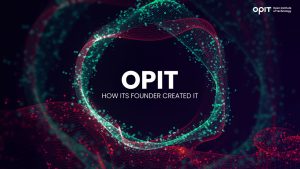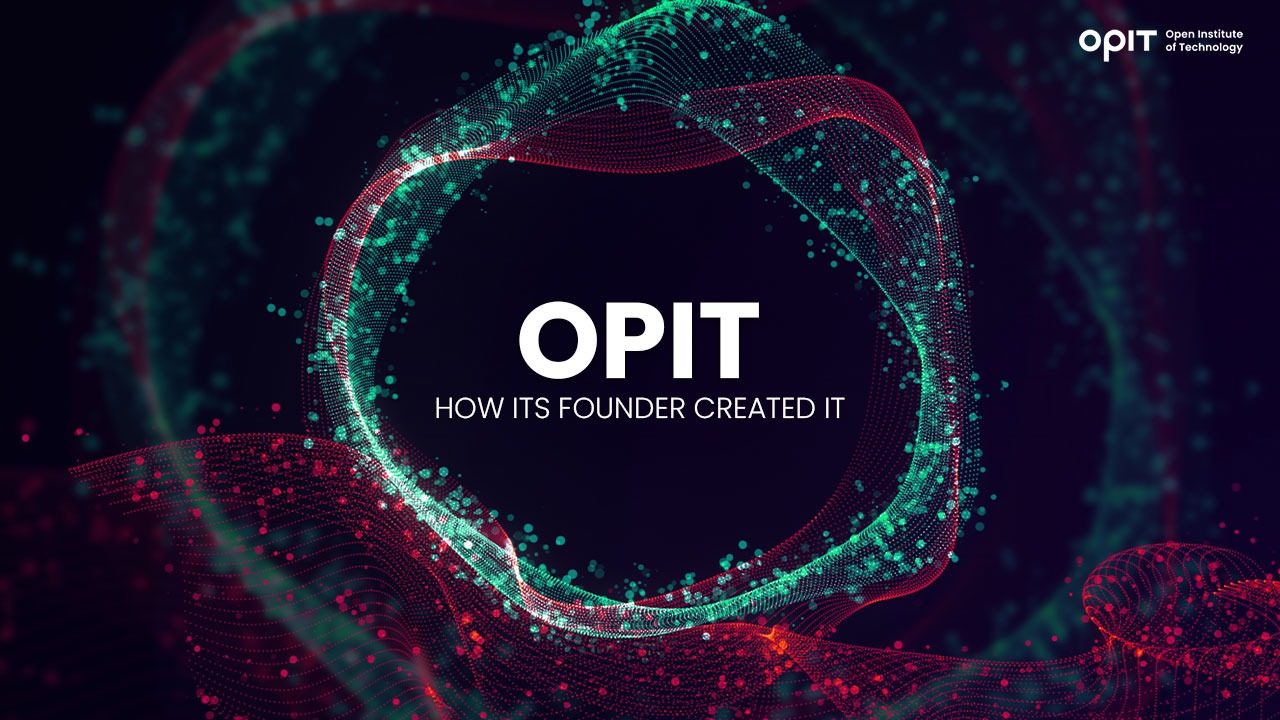Read the full article below (in Italian):


The Open Institute of Technology (OPIT) is a unique institution through and through. From an unparalleled support team that guides you every step of the way to state-of-the-art virtual resources, OPIT redefines online learning. This institution also proves that online education can be as enriching as its traditional counterpart. Better yet, it can outperform it in numerous aspects.
This fact alone begs the question – how did it all begin?
To answer this question, we’ll go straight to the source – the founder of OPIT, Riccardo Ocleppo.
In this article, Riccardo will walk us through his journey of envisioning (and building) OPIT and transforming online education in the process.
The Pre-OPIT Years: Where It All Began
To understand how Riccardo came up with the idea for OPIT, we must travel back to the year 2006. That’s when Riccardo graduated from Politecnico di Torino with a bachelor’s in electronics engineering.
This institution is arguably the most prestigious in Italy (and one of the most reputable in Europe). So, it shouldn’t be surprising that Riccardo chose to continue his education here, pursuing a master’s degree.
He completed the master’s program in 2008 and did so with honors.
Yet, Riccardo couldn’t shake the impression that it was all in vain. In his words, “When I left the university, I had the impression that I could do very little, and I knew very little that could help me in my professional endeavors.”
But Riccardo decided not to sit idly by.
He saw it this way – it might be too late for him, as he was done with his studies. But it’s certainly not too late for future students who deserve a better education. That’s why, only two years later, in 2010, he founded Docsity.
Docsity is an online social learning network with over 20 million registered students. Thanks to this network, over 250 universities worldwide received help in improving their study programs (and finding students).
Docsity also gave Riccardo a chance to fully immerse himself into the education sector for over a decade, finding new ways to reform it from within.
OPIT’s Inception: From Vision to Reality
With the knowledge (and the resources) from Docsity, Riccardo started working on a platform designed to provide the kind of education he wished he had received. The platform in question was, of course, the Open Institute of Technology.
The primary goal of OPIT was to bridge the gap between “what students expect, what companies need, and what higher-level institutions actually deliver in terms of training and education.”
From Riccardo’s experience, this gap was pretty huge. Remember that even with a bachelor’s and a master’s degree in electronics engineering, he felt he had little to offer to companies.
This perceived shortcoming primarily comes from the fact he received a lot of theory at the university but very little practice. And that’s not to mention how outdated the curriculum was, as well as laser-focused on electronics engineering. In other words, bid farewell to “competencies on the most recent technologies and project management methodologies.”
This perspective made him determined to create a holistic educational solution. Or, as Riccardo puts it, “When designing OPIT’s degree programs to address the skills in high demand today, we chose to start from scratch to go beyond the limits of traditional higher education.”
At OPIT, you’ll receive valuable knowledge beyond theory. Essentially, OPIT equips you with everything you need to enter the job market, ready to excel in your field from day one (or day zero, as Riccardo calls it!).
Tailored for Triumph: OPIT’s Unique Programs
Designing any online curriculum is no easy task. However, the computer science field comes with its unique set of challenges. Why?
This field is constantly evolving. That’s what makes it difficult for most traditional higher education institutions to keep up. As Riccardo puts it, “[These institutions] are very slow to adapt to this wave of new technologies and new trends within the educational sector.” Of course, thanks to Docsity, Riccardo speaks from extensive experience, as he’s seen “multiple times how difficult it is to help these institutions update their study curriculum.”
Companies have it no easier.
Riccardo says, “A company needs one to two years to make people that should be trained on today’s technologies and on today’s skills effectively enter the job market and be productive when they enter these companies.”
Again, Riccardo speaks from personal experience. As a founder of a tech company (and a manager in others), he was tasked with creating and managing big tech teams on several occasions. However, despite interviewing hundreds of candidates, he couldn’t find those trained in today’s technologies, not those from 20 years ago.
With this in mind, he designed OPIT’s curriculum to effectively “train the next generation of leaders and managers in the field of computer science.” Many people helped him in this endeavor, chief among them Professor Francesco Profumo, current head of institution at OPIT and former Minister of Education in Italy.
This unique approach makes OPIT’s programs different in terms of how they’ve been conceived and how they’ll be delivered.
Take the Bachelor of Science (BSc) in Modern Computer Science program as an example.
Riccardo says that to be a great programmer, “you cannot just dive into programming itself.” First, you must understand how a computer is built and how its various units operate and communicate. This way, you’ll have no issues debugging a code in the future since you’ll understand the underlying mechanisms.
These underlying systems and foundational skills are precisely what is taught during the first term of the modern computer science program. Afterward, you’ll move toward the latest advancements in computer science, including machine learning, artificial intelligence, data science, cybersecurity, and cloud computing. This way, you’ll have quite a broad perspective on computer science, rarely seen in other educational programs, online or offline.
It also means you won’t have to specialize in a particular field, as you’re forced to do with many other programs. In Riccardo’s opinion, the master’s degree is where you should begin your specialization journey.
OPIT offers as many as four master’s degree programs, but Riccardo focuses on Applied Data Science & AI this time.
In Riccardo’s words, “The whole purpose of this [program] is actually to train people that do not want to pursue a super technical career but actually want to pursue a career at the intersection between the tech and the management of a company.” In other words, individuals who complete this program will acquire all the necessary tech skills. However, they’ll also be able to ensure the tech team is “correctly understood by the management of the company,” thanks to the managerial skills earned during the program.
Of course, this program also covers all the essential theoretical knowledge, from Python to machine learning. But it also has a solid applicative angle, teaching students how to use the most valuable tools available in today’s market. Simply put, you’re training “for what you’ll be doing when you enter your next job.”
Breaking the Mold: What Sets OPIT Apart
The unique curriculum isn’t the only thing that sets OPIT apart from other higher education institutions in the same field. Here’s what Riccardo singles out as OPIT’s most appealing characteristics.
Continuous Assessment
Learning at your own pace can be a double-edged sword. On the one hand, you have all the flexibility and freedom to organize your studies (and life). On the other, you might start procrastinating without a traditional daily commitment of in-classroom learning.
OPIT ensures this unfortunate scenario never happens by doing away with one big final exam you must cram for. Instead, you’ll be continuously assessed throughout the program, allowing you a much better approach to learning and a deeper understanding of the subject matter.
As Riccardo puts it, OPIT will give you “multiple checkpoints,” preventing you from getting “lost” throughout the learning process.
New Learning Resources
According to Riccardo, most of today’s available resources were created for the “oldest wave of education.” That’s why he (and his team) created all OPIT resources and learning materials from scratch, giving you a fresh perspective on the tech world. These resources also come in the form of engaging videos, which are short enough to keep you fully focused yet detailed enough to provide a deep understanding of the topic.
World-Class Professors
Let’s not sugarcoat it – modern resources mean nothing if the professors teaching them still stick to old-school principles and approaches. Luckily, this isn’t the case with OPIT’s faculty.
Every member of this faculty has been carefully selected based on their academic expertise, business experience, and global perspective. These professors aim to “help you learn in a more engaging and interesting way,” as Riccardo puts it.
He also adds that OPIT’s faculty breaks away from the common saying in academics, “Those who can’t do, teach.” In his words, “We didn’t want to have people that can teach because they cannot do,” so that’s the standard he prioritized when bringing people on board.
Future-Proof Your Career
Now that you know the fascinating tale of OPIT’s conception, all that’s left to do is to get in touch with our team of experts and take the first step in future-proofing your career. As you’ve already seen, OPIT will take care of most of the subsequent steps. All you need is a desire to learn and an interest in developing new skills, and success is imminent.
Related posts

Source:
- Agenda Digitale, published on June 16th, 2025
By Lokesh Vij, Professor of Cloud Computing Infrastructure, Cloud Development, Cloud Computing Automation and Ops and Cloud Data Stacks at OPIT – Open Institute of Technology
NIST identifies five key characteristics of cloud computing: on-demand self-service, network access, resource pooling, elasticity, and metered service. These pillars explain the success of the global cloud market of 912 billion in 2025
Read the full article below (in Italian):

You’ve probably seen two of the most recent popular social media trends. The first is creating and posting your personalized action figure version of yourself, complete with personalized accessories, from a yoga mat to your favorite musical instrument. There is also the Studio Ghibli trend, which creates an image of you in the style of a character from one of the animation studio’s popular films.
Both of these are possible thanks to OpenAI’s GPT-4o-powered image generator. But what are you risking when you upload a picture to generate this kind of content? More than you might imagine, according to Tom Vazdar, chair of cybersecurity at the Open Institute of Technology (OPIT), in a recent interview with Wired. Let’s take a closer look at the risks and how this issue ties into the issue of responsible artificial intelligence.
Uploading Your Image
To get a personalized image of yourself back from ChatGPT, you need to upload an actual photo, or potentially multiple images, and tell ChatGPT what you want. But in addition to using your image to generate content for you, OpenAI could also be using your willingly submitted image to help train its AI model. Vazdar, who is also CEO and AI & Cybersecurity Strategist at Riskoria and a board member for the Croatian AI Association, says that this kind of content is “a gold mine for training generative models,” but you have limited power over how that image is integrated into their training strategy.
Plus, you are uploading much more than just an image of yourself. Vazdar reminds us that we are handing over “an entire bundle of metadata.” This includes the EXIF data attached to the image, such as exactly when and where the photo was taken. And your photo may have more content in it than you imagine, with the background – including people, landmarks, and objects – also able to be tied to that time and place.
In addition to this, OpenAI also collects data about the device that you are using to engage with the platform, and, according to Vazdar, “There’s also behavioral data, such as what you typed, what kind of image you asked for, how you interacted with the interface and the frequency of those actions.”
After all that, OpenAI knows a lot about you, and soon, so could their AI model, because it is studying you.
How OpenAI Uses Your Data
OpenAI claims that they did not orchestrate these social media trends simply to get training data for their AI, and that’s almost certainly true. But they also aren’t denying that access to that freely uploaded data is a bonus. As Vazdar points out, “This trend, whether by design or a convenient opportunity, is providing the company with massive volumes of fresh, high-quality facial data from diverse age groups, ethnicities, and geographies.”
OpenAI isn’t the only company using your data to train its AI. Meta recently updated its privacy policy to allow the company to use your personal information on Meta-related services, such as Facebook, Instagram, and WhatsApp, to train its AI. While it is possible to opt-out, Meta isn’t advertising that fact or making it easy, which means that most users are sharing their data by default.
You can also control what happens with your data when using ChatGPT. Again, while not well publicized, you can use ChatGPT’s self-service tools to access, export, and delete your personal information, and opt out of having your content used to improve OpenAI’s model. Nevertheless, even if you choose these options, it is still worth it to strip data like location and time from images before uploading them and to consider the privacy of any images, including people and objects in the background, before sharing.
Are Data Protection Laws Keeping Up?
OpenAI and Meta need to provide these kinds of opt-outs due to data protection laws, such as GDPR in the EU and the UK. GDPR gives you the right to access or delete your data, and the use of biometric data requires your explicit consent. However, your photo only becomes biometric data when it is processed using a specific technical measure that allows for the unique identification of an individual.
But just because ChatGPT is not using this technology, doesn’t mean that ChatGPT can’t learn a lot about you from your images.
AI and Ethics Concerns
But you might wonder, “Isn’t it a good thing that AI is being trained using a diverse range of photos?” After all, there have been widespread reports in the past of AI struggling to recognize black faces because they have been trained mostly on white faces. Similarly, there have been reports of bias within AI due to the information it receives. Doesn’t sharing from a wide range of users help combat that? Yes, but there is so much more that could be done with that data without your knowledge or consent.
One of the biggest risks is that the data can be manipulated for marketing purposes, not just to get you to buy products, but also potentially to manipulate behavior. Take, for instance, the Cambridge Analytica scandal, which saw AI used to manipulate voters and the proliferation of deepfakes sharing false news.
Vazdar believes that AI should be used to promote human freedom and autonomy, not threaten it. It should be something that benefits humanity in the broadest possible sense, and not just those with the power to develop and profit from AI.
Responsible Artificial Intelligence
OPIT’s Master’s in Responsible AI combines technical expertise with a focus on the ethical implications of AI, diving into questions such as this one. Focusing on real-world applications, the course considers sustainable AI, environmental impact, ethical considerations, and social responsibility.
Completed over three or four 13-week terms, it starts with a foundation in technical artificial intelligence and then moves on to advanced AI applications. Students finish with a Capstone project, which sees them apply what they have learned to real-world problems.
Have questions?
Visit our FAQ page or get in touch with us!
Write us at +39 335 576 0263
Get in touch at hello@opit.com
Talk to one of our Study Advisors
We are international
We can speak in:


